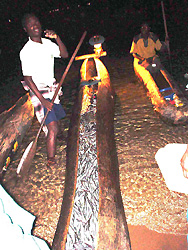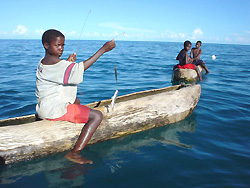| Period: 31 January - 31 March 2004. Country: Malawi |
|
(1) To Know is to Own: Knowledge and Property among Small-Scale Fishers on Lake Malawi |
| NAKAYAMA Setsuko (Division of African Area Studies) |
| Key Words: Indigenous Knowledge, Property Relations, Resource Management, Fishing Unit, Catch Distribution |

"Secrets" are important in usipa (Engraulicypris sardella) fishery. |

Boys handlining for cichlids (Diplotaxodon spp.) do not "know" yet. |
(2) The purpose of the dissertation is to describe and analyze resource use, perceptions and social relationships among artisanal fishers on Lake Malawi, with a special focus on the construction of property relations.
Lake Malawi, boasting the largest number of indigenous freshwater fish species in the world, is an internationally acclaimed hotspot for biodiversity conservation. The fish in the lake also support the surrounding human population as a source of nutrition and income. In most lakeshore communities, however, resource management and property regimes are reportedly nonexistent, and a serious degradation of fishery resources is anticipated. In consideration of this, the Government of Malawi has attempted to extend participatory approaches in fisheries resource management to Lake Malawi since the late 1990s. The fruits, however, are yet to be seen.
I have been researching fisherfolk on the central western shore of Lake Malawi since 1996. Fishers at the research site often remarked, "the lake belongs to God," and thus that "we can fish wherever we like." Such views do not contradict previous reports. However, once actual fishing practices were observed and analyzed, it became obvious that fishers were operating in an orderly manner on selected fishing grounds. Likewise, the passage "Lake Malawi is owned by God" was multivocal and could not be reduced to a simple justification for fishers' mobility. I would like to describe the patterns that are salient in fishers' practices, knowledge and speech, and analyze the dynamic processes in which they are generated and reconstructed. I shall also discuss how these patternscan be interpreted in terms of concepts of property relations and resource management that underly the current fishery policy.
(3) The field research was conducted on the west central shore of Lake Malawi near Nkhata Bay, between January 31 and March 31, 2004 . At this summation phase for the dissertation, the emphasis was placed on the following three points:
- Historical transformation of fishing and related activities
I have conducted interviews mainly with retired fishers to reconstruct the historical transformation of fishing and related activities in my area of research. The transformation of fishing technology, fishing units and the distribution of catch can be interpreted as a series of conflicts and negotiations accruing from movements of people, mainly returned migrant workers. Case analyses showed that fishers at the field site had a clear sense of property and conflict-solving mechanisms governing access to fishery resources.
- Spatial cognition
Interviews with fishers showed that they identified their location on the lake by checking the alignment of three pairs of terrestrial objects. These terrestrial objects included trees, buildings, mountains and river mouths. At night, the fishers used electric lights and beach fires instead. I took GPS readings for sixty points on the lake comprising fourteen major fishing grounds, and their corresponding terrestrial objects. The process was videotaped and played during interviews with fishers in order to crosscheck the results. The data is now being processed into a map of fishing grounds in the area.
- Feedback interviews
I visited focal fishers who I had met during previous fieldwork to conduct interviews using the quantitative data collected in 1998 as feedback material. The results revealed that property relations concerning fishery resources were constructed through the management of certain types of knowledge. Furthermore, important decisions concerning collective action, such as the setting of fishing seasons or exclusive use of certain fishing grounds, were based on such knowledge. To those who "knew," it was "their lake." Among the fishers at the research site, indigenous resource tenure and management did exist. Because they were constructed through the management of knowledge, however, these factors remained invisible to "outsiders" who "didn't know."
Discussions with the research counterpart suggest that similar practices prevail in other parts of the lake. These results have strong implications for current fishery policy on Lake Malawi. Indigenous knowledge has an order that allows the determination of power relations concerning access to resources. We should be fully aware that this situation is not closed to fishers alone, but inevitably involves various stakeholders including researchers and government officials.
|


 21st Century COE Program
-Aiming for COE of Integrated Area Studies-
21st Century COE Program
-Aiming for COE of Integrated Area Studies-